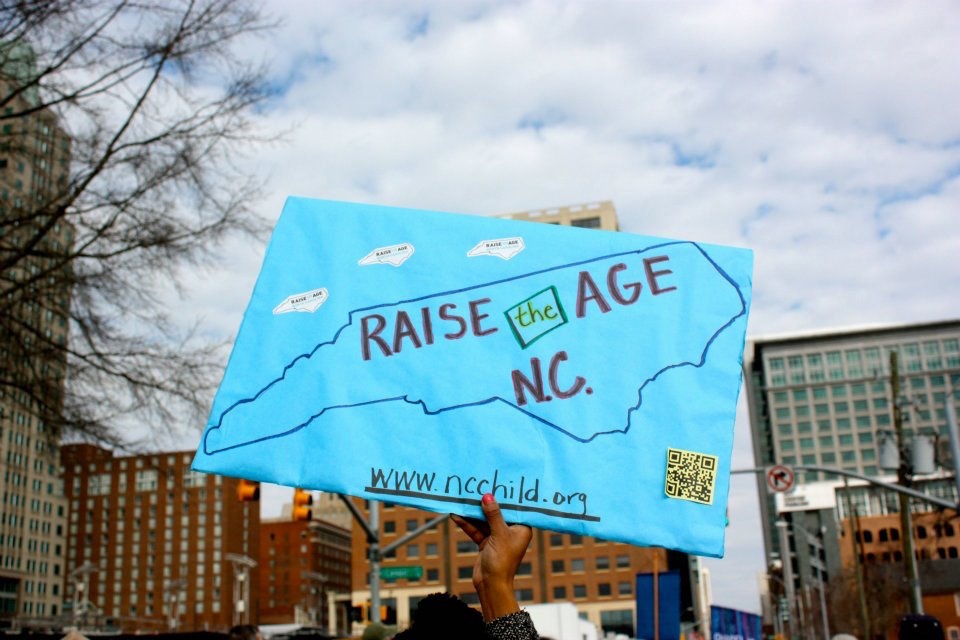North Carolina raises the age for adult prosecution, but not in all cases

(Photo from Raise the Age North Carolina's Facebook page.)
Last month the North Carolina General Assembly passed a law that will raise the age of adult prosecution for most crimes from 16 to 18, finally pushing through a reform that legislators have been considering since the 1950s. Included in the contested $23 billion state budget, the Juvenile Justice Reinvestment Act (JJRA) had overwhelming bipartisan support, with backing from groups as disparate as the liberal ACLU and the conservative John Locke Foundation.
Set to go into effect in December 2019, the law makes North Carolina the last state in the nation to stop automatically sending all 16- and 17-year-olds into to the adult system.
"Instead of saddling our kids with the consequences of a lifelong criminal record, we will provide more effective and rehabilitative services to those who desperately need it," Peggy Nicholson, co-director of the Youth Justice Project at the nonprofit Southern Coalition for Social Justice (SCSJ) in Durham, North Carolina, said in a statement. "Raising the age protects our kids from the harms of the adult criminal system, as well as our communities by reducing recidivism rates."
The JJRA's passage was the culmination of a process of juvenile justice reform in North Carolina that began in 1998, resulting in a drop of the state's incarcerated juvenile population from 1,400 to fewer than 200 and cutting the recidivism rate in half. That year a commission assigned to research ways to improve the juvenile system came up with 61 recommendations. The state soon after adopted all but one: the call to raise the age of juvenile jurisdiction.
The JJRA requires North Carolina to make upfront investments. It's more expensive to move young people through the juvenile criminal justice than the adult system, and the state is now building a $13.2 million Youth Development Center in Rockingham County to account for the expected influx of 16- and 17-year-olds.
But in the end, the law is expected to have significant economic benefits. It will bring an estimated 12 percent reduction in recidivism for teens sent to the juvenile rather than adult system, and that will mean lower long-term costs for law enforcement, courts, incarceration and victim services.
Additionally, sending most 16- and 17-year-old offenders to the juvenile system will prevent them from getting adult convictions, which are public record and severely diminish lifetime earnings due to lost employment opportunities. A 2011 analysis of a similar version of the JJRA prepared for the state estimated that the law would have an average economic benefit of $52 million annually over the next 35 years.
Adult justice a danger for youths
While North Carolina's "raise the age" legislation represents a major improvement to the state's approach to public safety and criminal justice, youth advocates are declaring only a partial victory.
For one thing, the law will still allow some youth under 18 to be treated like adults. Several classes of offenses ranging from first-degree murder to burglarizing an empty home will still result in 16- and 17-year-old defendants automatically being sent to adult courts. For serious felonies, prosecutors can still seek to charge children as young as 13 as adults, which would require judicial approval.
Once in effect, the JJRA will divert an estimated 12,000 teens from the adult to juvenile courts every year, according to a fiscal note attached to the legislation. But until then, all 16- and 17-year-olds will continue to be automatically sent to the adult system, victims of the limbo between the law's passing and its implementation.
Their criminal records will earn lead to a lifetime of complications and barriers, says Ricky Watson, co-director of the SCSJ's Youth Justice Project.
"It could be anything from not being able to qualify for a loan to qualifying to get a place in an apartment to being able to enroll in a university or a community college," Watson said. "If you had a conviction and sometimes even just a charge on your record from the adult system, you're blocked from being able to do a lot of different things you might want to do in your future."
In the last legislative cycle, both the North Carolina House and Senate considered bills to help people convicted of certain offenses before they were 18 get their records cleared, but neither passed.
Youth also face imminent dangers when locked up with adults. Youth held in adult jails or prisons are five times more likely to be sexually assaulted than those in juvenile facilities, and they are 36 times more likely to commit suicide. Rates of physical assault are also higher for juveniles held with adults, and they are more likely to commit crimes in the future.
This is why many advocates for youth reject the idea that treating children as adults is ever a good idea. Alicia D'Addario is an attorney at the Alabama-based Equal Justice Initiative, a legal nonprofit that has challenged mandatory life sentences for juveniles. She notes that the U.S. Supreme Court has recognized in a number of cases that children are different than adults.
"They do have this incredible potential for rehabilitation," she said. "Even when they commit the most serious crimes, it benefits us as a society to invest in that possibility of rehabilitation and to not treat children as though they're adults because they aren't."
Tags
Jordan Wilkie
Jordan is a master's student at the UNC-Chapel Hill School of Media and Journalism and an intern with the Institute for Southern Studies/Facing South.
